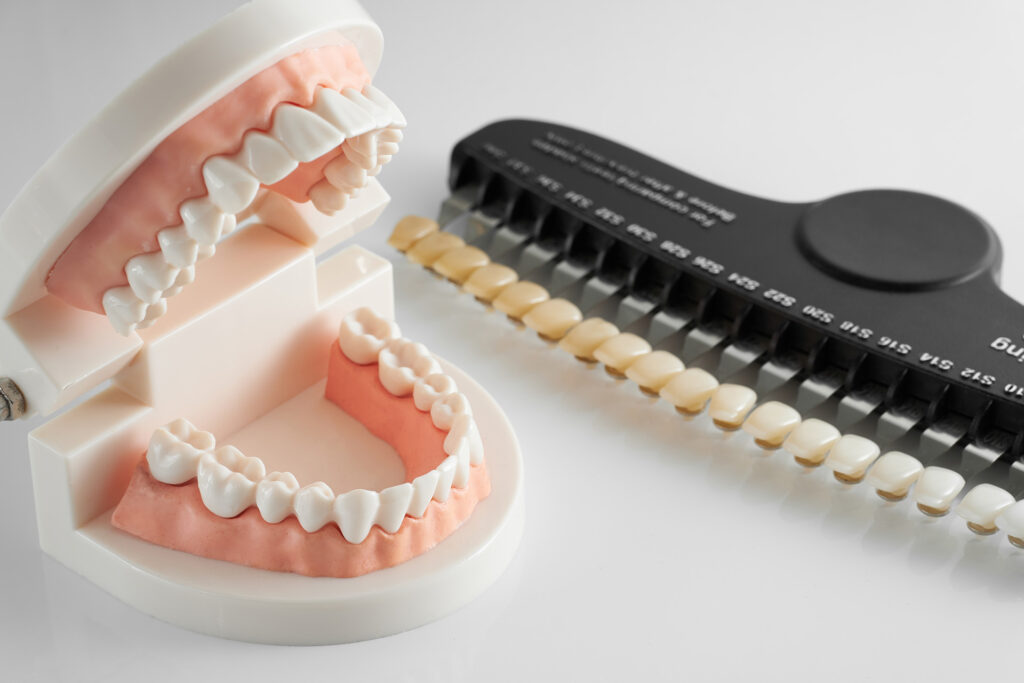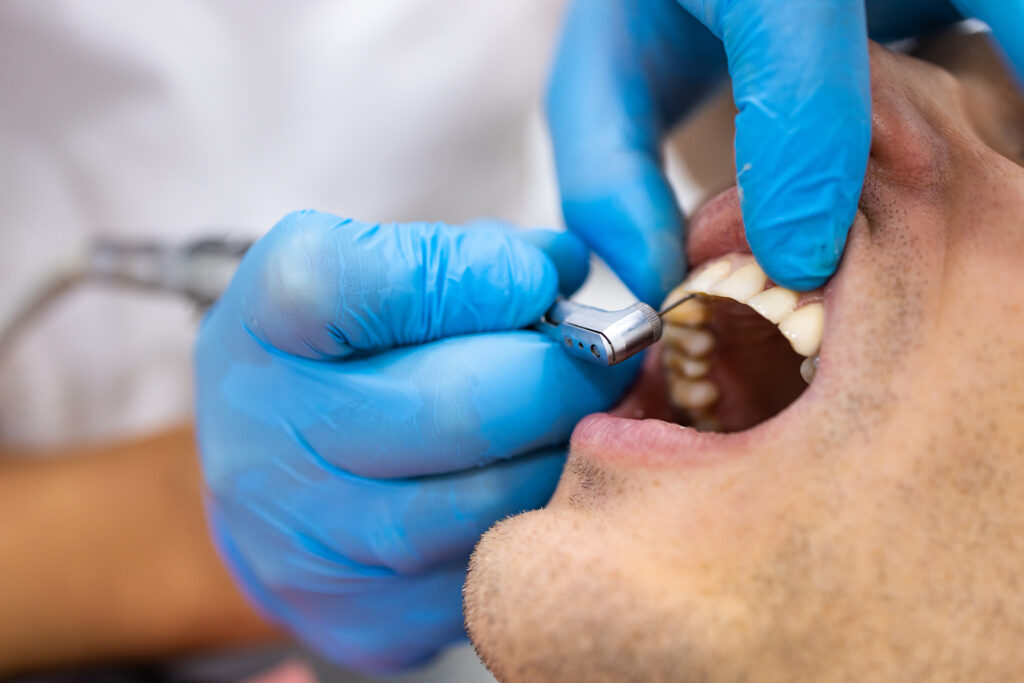Introduction to Dental Restoration
Dental restoration plays a crucial role in both the aesthetic and functional aspects of oral health.
Whether you’re dealing with discoloured, chipped or damaged teeth, two of the most common solutions are veneers and crowns. Understanding these options can help you and your dentist decide on the most suitable treatment for your needs. While both improve the appearance of your smile, they serve slightly different purposes and are recommended depending on the condition of your teeth.
Determining whether a veneer or a crown is right for you depends on the extent of the damage and your goals. Both can be used in dental treatments to restore damaged teeth, while crowns may be used to provide additional support and protection. These treatments are bonded to your teeth, tailored to your needs, and help restore the function of your teeth for better chewing and oral health.
Your dentist will explain the process and guide you through each step. If you are considering dental restoration or have teeth that are damaged, discoloured or weakened, these options may be suitable for you.

What Are Veneers?
A dental veneer is a thin layer of material, typically porcelain or composite resin, bonded to the front surface of your tooth. Dental veneers are primarily used for cosmetic improvements, such as discolouration, minor chips or gaps, and are a popular choice for enhancing the appearance of your smile.
The procedure typically requires two to three dental visits and involves removing approximately half a millimetre of enamel to ensure a proper fit. Veneers are then bonded to your teeth using a strong dental adhesive. The final result will be a natural-looking, improved smile tailored to your aesthetic goals.

Types of Veneers
When considering veneers, your dentist will typically recommend either porcelain or composite veneers, depending on your specific needs, goals, and budget. Porcelain veneers are more stain-resistant and durable, typically lasting between 10 and 15 years. However, they are usually more expensive per tooth compared to composite veneers. Composite veneers are a more affordable alternative, with a lower cost per tooth. They tend to wear down faster and may require more frequent replacement, typically every 5 to 7 years.
The choice between these types often comes down to balancing durability with cost and deciding how long you want your dental work to last. Your dentist will help you weigh the pros and cons of each option in the context of your oral health and cosmetic goals and recommend the best solution suited to your smile.

What Are Crowns?
Dental crowns are tooth-shaped caps designed to restore and protect damaged teeth. A dental crown is a restoration that covers the entire tooth, unlike veneers, which only cover the front surface of the tooth. Crowns can be used to restore teeth that have been weakened or damaged and to improve their appearance, shape, or alignment.
Tooth decay is a common reason for needing a crown, as the decayed portion must be removed before the crown can be placed. The process of getting a crown will be completed over multiple visits, including preparation and fitting. Sometimes, a tooth needs to be rebuilt and may require reinforcement if it has extensive damage, as the tooth needs to be strong enough to support the crown. The dentist must be able to reconstruct the tooth or ensure it can support the crown for long-term success.
For a crown to fit correctly, about 1-2 millimetres of the tooth surface is typically filed down. The cost is usually calculated per tooth, depending on the material and complexity. The most significant difference between veneers and crowns is that crowns provide full coverage and are better suited for teeth with significant structural issues.
Crowns can be made from a range of materials, including porcelain, ceramic and metal alloys. The choice of material often depends on the location of the tooth, the patient’s aesthetic preferences and budget. Porcelain and ceramic crowns are often used for front teeth due to their natural appearance, while metal crowns offer superior strength and are ideal for molars.

When to Choose a Dental Crown vs Veneer
Choosing between a veneer vs a crown is an important decision, as each veneer or crown serves different purposes depending on the condition of your tooth and your goals. Your dentist will walk you through the varied crowns vs veneers pros and cons so you can make an informed decision, but here are the broad strokes of the differences between them:
Crowns are generally recommended when a tooth has extensive damage or tooth decay and requires reinforcement. If you have a tooth that is severely weakened, a crown can be used to restore both the appearance and the function of your tooth. As a crown covers the entire tooth, crowns offer more protection and are often used after procedures like root canals.
Veneers, on the other hand, are ideal when the primary concern is cosmetic. If you have a mostly intact tooth and you want to improve its shape, colour or alignment, a veneer may be a better option. If you are looking for a less invasive solution, veneers preserve more of your natural tooth and can produce dramatic aesthetic changes. The final result will be a natural-looking improvement that enhances your smile while maintaining the function of your teeth.

Crown vs Veneer Cost
The cost per tooth for crowns and veneers can vary widely depending on the material and complexity. For a single porcelain veneer, the price is typically higher than for a composite veneer, but it may still be less than the cost for a crown per tooth. Crowns usually involve more extensive dental work and lab fees, especially if they require special materials or are used to rebuild severely damaged teeth.
It’s worth noting that while composite veneers cost less upfront, they may need to be replaced more often than porcelain veneers, resulting in higher future expenses over time. Porcelain veneers and crowns offer greater longevity but come at a higher initial price. Your dentist can give you a detailed breakdown tailored to your needs and help you make a cost-effective decision based on what is best for your specific case.

Veneers vs Crowns Pros and Cons
Both veneers and crowns come with their advantages and limitations. Veneers can provide a highly aesthetic result, are less invasive, and preserve more of your natural tooth. Veneers can be used to address cosmetic concerns such as discolouration, chips, or minor misalignments. However, they are not suitable for severely damaged or decayed teeth, as the final appearance may not be natural and seamless.
Crowns offer more durability and protection but require more extensive tooth reshaping. Crowns can be used to restore teeth that are significantly weakened, cracked, or have undergone root canal treatment. The process will be completed over multiple visits, often involving temporary fittings, and the final crown will be custom-matched to your smile.
Weighing the pros and cons of veneers versus crowns, in consultation with your dentist, is essential for making a confident and informed decision based on your specific needs.

Procedure and Preparation
The procedures for veneers and crowns vary in complexity. Veneer placement typically requires the removal of about half a millimetre of enamel for a proper fit. An impression is then taken and sent to a lab for custom fabrication. Once ready, the veneer will be bonded to your teeth.
For crowns, more of the tooth structure must be removed to make room for the crown, as a crown covers the entire tooth. If the tooth is extensively damaged, it needs to be rebuilt and may require reinforcement to support the crown. After reshaping, an impression is taken and a temporary crown is placed while the permanent one is made. On the second visit, the permanent crown will be fitted and cemented to your teeth.

Durability and Longevity
With proper care, both veneers and crowns can last for many years. Porcelain veneers typically last 10 to 15 years, while crowns can last up to 15 years or longer. The longevity of your restorations will be influenced by factors such as the material used, oral hygiene, bite force, and habits like teeth grinding (bruxism).
If a veneer or crown needs to be replaced, the cost is usually calculated per tooth and may vary depending on the material and complexity. While no dental restoration lasts forever, maintaining good oral hygiene and visiting your dentist regularly can extend the lifespan of both veneers and crowns. Avoiding hard foods and refraining from using your teeth as tools also helps prevent premature wear and damage on your crowns or veneers.
Speak to TEETH @ Tiong Bahru About Veneers or Crowns
At TEETH @ Tiong Bahru, we believe every smile tells a story unique to your needs and goals. Whether you’re considering a crown to repair a damaged tooth or veneers to enhance your smile, our experienced team is here to help. If you have concerns about the appearance or strength of your teeth, we offer both solutions and will work with you to determine the most effective treatment for your needs. The outcome will be a restoration that blends seamlessly with your natural teeth and supports your long-term oral health.
With personalised care, advanced materials, and a focus on long-term outcomes tailored to your situation, we ensure that every patient walks out of our clinic with renewed confidence. Book a consultation with TEETH @ Tiong Bahru today to learn more about veneer or crown options and find the solution that’s right for you.







